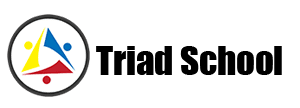Q What is a Custom Curriculum?
A curriculum describes what students will be expected to learn by the end of school year. A custom curriculum describes a tailored set of expectations for a student based on individual abilities.
At Triad we believe each student is unique. We make learning personal. We use a custom curriculum that is flexible and adaptive. It allows students to learn at their own pace and ability. Our custom curriculum, small class sizes and individual attention supports this approach.
Q What is ability grouping?
A classroom approach which groups students together having similar academic ability. It delivers the right content, to the right student, at the right pace and at the right time. Additionally, because the students are concentrated with others who have similar levels of knowledge and learning rates they can better challenge one another to grow further. This is unlike a traditional education setting where students are grouped together by age. For example, students who are in first grade are usually between 6 and 7 years old at the beginning of the school year. Also, ability grouping should not be confused with a Montessori approach where students have mixed age classrooms. Once again, this is an approached based on age, not ability.
Q How does Triad customize the curriculum?
Triad uses an online program called Odyssey through Compass Learning . Odyssey provides an intensive and comprehensive initial diagnostic assessment. With these results the teacher is able to create a custom learning path for the student. The teacher then monitors the lessons created and works with the students as they progress on their customized path.
This program asses the student on a constant basis and gives instant feed back to the teacher. The teacher can then assign the appropriate lessons. The program is an interactive program teaching students in an engaging way. If the student is struggling in an area the program will back up the lesson and re-teach the student. The teacher then works with the student to help in the areas where the student needs additional help.
Q Why is a Custom Curriculum better than grade skipping?
Traditionally, if a student has mastered a subject a school will allow the child to move a grade level ahead. This solves the problem of offering the student more challenging material but it doesn’t solve the problem with the pace the material is taught. With the more challenging material the student may need more time to grasp concepts than his/her peers OR maybe the student simply learns faster his/her peers. Either way grade skipping is only part of solution. At Triad we never assume because a student is either advanced or in need of remediation in one subject he or she would require that same level of instruction in all subjects.
Q Why use a custom curriculum and not acceleration as others schools do?
Acceleration – This method shortens the time a student spends learning the K-12 curriculum. It allows the student to learn above their current grade level. Sometimes this is done by subject or by the entire grade (grade skipping).
Custom Curriculum – This method tailors the curriculum for a student in order to meet their ability levels and learning needs. A custom curriculum has the benefits of acceleration without the downfalls of the accelerated approach.
Downfalls with acceleration:
Q Does Triad’s curriculum align with Common Core standards?
Yes, Triad’s students meet and usually exceed these standards.
Q In what ways is Triad like traditional schools?
Triad’s students still write papers, do research projects, book reports, and give presentations. Although Triad is different from other schools, we realize our students will still have to transition into a traditional atmosphere once leaving Triad. Our teachers will work with the family to ensure the student is prepared to go to the next school, whether it is the Davidson Academy, Monogue, Sage Ridge or into Washoe County School District.
Q What sets Triad apart from other schools?
- Triad has the lowest student to teacher ratios in Reno.
- Triad is a small school.
Because of this small size and customized curriculum, our students cannot “fall through the cracks”. The parents have a direct line of communication with the directors and the teachers. Your concerns will be heard and dealt with to our best ability. - Triad has a custom curriculum.
Other schools may say they can level up or level down to meet their students’ needs. However, this is very difficult to truly do in a traditional classroom. The school may be able to supplement the students’ curriculum but the student is still required to stay in line with the rest of the class. - Reno’s only school with a SEL Curriculum .
Triad has partnered with Theory and Practice , a local group of psychologist, to provide a SEL Curriculum - Triad’s academic assessments are administered one on one by a third party. Triad could do this in house but we believe we should turn to people who are trained and unbiased.
- Triad students have:
- Spanish taught 4 days a week
- Violin 4 days a week
- Hands on Science – Hands-on Science encourages learning by doing. This form of education encourages children to experience science by participating in experiments.


